McGill Global Health Programs is thrilled to announce the selection of the first two Steinberg Global Health Postdoctoral Fellows. Established in 2015 by The Blema and Arnold Steinberg Family Foundation, the award is for entering or current postdoctoral fellows at McGill University who are pursuing research related to global health in low or middle income countries or among Aboriginal populations in Canada. The Fellowship is awarded by the Faculty of Medicine, upon recommendation of Global Health Programs, to one or more postdoctoral fellows on the basis of academic merit. The Fellowship stipend is $45,000, plus an annual travel stipend of $5,000 and may be renewable once.
2015 Steinberg Global Health Fellows
 Vincent Duclos is a Steinberg Global Health Postdoctoral Fellow in the Department of Social Studies of Medicine at McGill University. He has held academic positions at Laboratoire d’anthropologie sociale (Collège de France) and the Collège d’études mondiales (FMSH) in Paris. He has completed his PhD in anthropology at Université de Montréal in 2013, and has been a visiting doctoral student at the Max Planck Institute for Social Anthropology in Halle (Germany). His research expertise includes global health, digital media, the reconfiguration of health-related practices, development theories, social studies of science and technology as well as relations between India and the African continent. He has conducted research in India, in West Africa (Senegal and Burkina Faso) and in Canada. Dr. Duclos has published articles in various scientific journals.
Vincent Duclos is a Steinberg Global Health Postdoctoral Fellow in the Department of Social Studies of Medicine at McGill University. He has held academic positions at Laboratoire d’anthropologie sociale (Collège de France) and the Collège d’études mondiales (FMSH) in Paris. He has completed his PhD in anthropology at Université de Montréal in 2013, and has been a visiting doctoral student at the Max Planck Institute for Social Anthropology in Halle (Germany). His research expertise includes global health, digital media, the reconfiguration of health-related practices, development theories, social studies of science and technology as well as relations between India and the African continent. He has conducted research in India, in West Africa (Senegal and Burkina Faso) and in Canada. Dr. Duclos has published articles in various scientific journals.Summary of Dr. Duclos’ project: Over the last few years, interventions that rely on digital media to provide medical solutions have
 been proliferating on a global scale. Patients, medical practitioners, hospitals, and laypersons are increasingly connected, either through private networks, or the Internet. Under the impulsion of governmental agencies, international institutions, NGOs, and private sector players, mHealth is rapidly gaining importance on the global health agenda. Defined as medical and public health practice supported by mobile devices (WHO 2011), foreshadows critical changes in the management of individual patients and population health. All in all, it promises to transform global health by linking bodies, knowledge, and health practices in new spatial and temporal configurations. This research examines such configurations.
been proliferating on a global scale. Patients, medical practitioners, hospitals, and laypersons are increasingly connected, either through private networks, or the Internet. Under the impulsion of governmental agencies, international institutions, NGOs, and private sector players, mHealth is rapidly gaining importance on the global health agenda. Defined as medical and public health practice supported by mobile devices (WHO 2011), foreshadows critical changes in the management of individual patients and population health. All in all, it promises to transform global health by linking bodies, knowledge, and health practices in new spatial and temporal configurations. This research examines such configurations.This research focuses on a mHealth initiative (MOS@N) currently being implemented in the district of Nouna, in rural Burkina Faso. In a context where loss to follow-up is a major public health challenge, MOS@N uses mobile technology to improve the medical monitoring of participating pregnant women and people living with HIV/AIDS. Currently implemented in 26 villages, the project involves the participation of primary health centres. Conducted in close collaboration with the Centre de Recherche en Santé de Nouna, this research contributes in documenting the impact of MOS@N on the monitoring of patients and, ultimately, on the utilization of utilization of healthcare services in low-resource settings. This research will make a significant anthropological contribution to the study of global health. Its primary aim is to understand how mHealth forges new relations between technology, knowledge, and healthcare on a global scale. It aims to examine how connected spaces of medical care transform the government of human life. More broadly, this research will contribute to interdisciplinary scholarly research on techniques and rationalities that shape global health as a field of knowledge and intervention.
 Lena Shah received her PhD in Epidemiology from McGill University and a Master´s of Community Health from the University of Manitoba. She has spent the past three years in Lima, Peru undertaking her doctoral research on the role of household contact tracing in a tuberculosis (TB) endemic area. Prior to this, Lena was a Field Epidemiologist (2006-08, cohort 32) with the Canadian Field Epidemiology Program (CFEP) of the Public Health Agency of Canada and placed at the British Columbia Centre for Disease Control in Vancouver. Lena’s collaboration on the investigation of a TB outbreak on Vancouver Island as a field epidemiologist resulted in a co-authored publication in the New England Journal of Medicine (2011). Her areas of interest include working in marginalized populations, studying the transmission of TB, HIV and sexually transmitted infections, use of social network methods in outbreak investigations and applied public health research.
Lena Shah received her PhD in Epidemiology from McGill University and a Master´s of Community Health from the University of Manitoba. She has spent the past three years in Lima, Peru undertaking her doctoral research on the role of household contact tracing in a tuberculosis (TB) endemic area. Prior to this, Lena was a Field Epidemiologist (2006-08, cohort 32) with the Canadian Field Epidemiology Program (CFEP) of the Public Health Agency of Canada and placed at the British Columbia Centre for Disease Control in Vancouver. Lena’s collaboration on the investigation of a TB outbreak on Vancouver Island as a field epidemiologist resulted in a co-authored publication in the New England Journal of Medicine (2011). Her areas of interest include working in marginalized populations, studying the transmission of TB, HIV and sexually transmitted infections, use of social network methods in outbreak investigations and applied public health research.Summary of Dr. Shah’s project: This postdoctoral research builds upon a CIHR funded research project to estimate the effectiveness of an active
 case finding program for the evaluation of household contacts of tuberculosis (TB) cases in an endemic area. During my doctoral thesis work, I designed and implemented a pragmatic stepped-wedge cluster randomized trial in one of the largest and most densely populated districts of Lima, Peru. Through this study, I supervised the design, training, roll out, data collection and supervision of a contact screening intervention within a routine TB program operated through Ministry of Health clinics. This postdoctoral work will continue to strengthen this operational research program with collaborators from Canada, the United States and Peru.
case finding program for the evaluation of household contacts of tuberculosis (TB) cases in an endemic area. During my doctoral thesis work, I designed and implemented a pragmatic stepped-wedge cluster randomized trial in one of the largest and most densely populated districts of Lima, Peru. Through this study, I supervised the design, training, roll out, data collection and supervision of a contact screening intervention within a routine TB program operated through Ministry of Health clinics. This postdoctoral work will continue to strengthen this operational research program with collaborators from Canada, the United States and Peru.The first phase of the postdoctoral work will complete analyses related to the main study trial data. Including baseline data and the crossover of 34 health centres at 4 time points to the intervention, this study includes data from 3000 TB case patients and approximately 12,000 household contacts identified by the routine public health program. During the postdoctoral research program, a mixed methods study, including a qualitative research component, will be undertaken. This complementary study will examine the perspectives of frontline TB program staff in undertaking routine systematic active case finding of household contacts of TB cases and their experiences during the implementation phases of the study trial.
